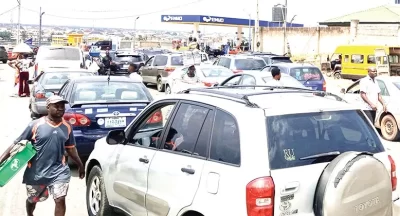Scarcity: Nigeria’s Problem is Distribution, Not Supply, Says PENGASSAN
National President of PENGASSAN, Mr. Festus Osifo, said yesterday that there was enough stock of petrol in Nigeria, despite the scarcity in various parts of the country. Osifo spoke on a national television programme.
He maintained that Nigeria had a distribution problem, since the tanker drivers were not loading as much as they should because of unresolved issues around the “bridging fund.”
In addition, the PENGASSAN leader stated that private depots were selling their products above the N148 official ex-depot price because of some inbuilt logistics, making it impossible for retailers to sell at the official N165 per litre.
Osifo stated, “The ex-depot price of this product is N148 as of today and there are some costs that are built into it. And one of the costs is the bridging fund, which NNPC would collect and remit to the NMDPRA.
“So now at a particular time, they agreed with the truck drivers that bridging fund will be N10 per litre, depending on the destination you are going all over the country. At the time they agreed, the cost of diesel was about N250.
“But today the cost of diesel is over N700, it has tripled. So the expectation from the tanker drivers is that since the cost of diesel has gone up, instead of paying N10 you have to multiply by three.”
Osifo stressed that the tanker drivers were not charity organisations, but were in business to make money, saying that even though Nigeria has close to two billion litres available in terms of petrol stock, it has been difficult getting the fuel to the filling stations.
“So the problem is not the stock, we have the stock all over depots. The truck drivers, most of them are not willing to lift this product,” he added.
NNPC is the sole importer of petrol.
Osifo stated that while it was possible for the national oil firm to sell at N148 at NNPC depots, private depots could not sell at the same price to retailers because of extra costs they bore to take the products to their depots.
He explained, “So they sell at a premium. And at the end of the day, they sell between N150 to N160. In some cases, they sell at N162 and if they sell at that amount, it will now be difficult for the retailer to go and sell about N165.
“This is because you cannot buy products at up to N163, then pay some other transportation costs, plus your cost of operation and you are being asked to sell for N165.”
For this reason, he explained, some retailers had declined to buy the products, leading to many petrol stations being closed for not having supply.
Osifo added that Lagos had been free from supply issues before now because until recently, the retailers were okay with how much they were getting the product and selling to retailers.
But he said, “There’s problem along the distribution line.”
To resolve the problem, Osifo insisted that the federal government must define the short, medium and long-term approach to tackling it.
In the short term, he stated that there were already on-going discussions between the government and the tanker drivers, with a deal in sight to increase the bridging fund from about N10.4 to over N20.
He said, “So if they do that, although the tanker drivers are still pushing to add something to that, what is going to happen is that drivers will start loading and once they start loading, you are going to have petrol all over the country.”
Osifo also urged the Nigerian Midstream and Downstream Petroleum Regulatory Authority (NMDPRA) to visit the private depot owners and discuss with them with a view to enforcing and implementing the approved price regime.
In the long term, Osifo maintained that Nigeria must begin to refine its products in-country, which had been the yearning of the trade unions. He said the cost of fuel was generally higher in countries that did not produce or refine their products.
He said if subsidy were removed today, Nigerians would be buying petrol for between N400 to N500, stressing that while the subsidy is meant to pay for the difference between the price it is imported and when it gets to the depots, it doesn’t necessarily take care of bridging costs.
Osifo stated, “You remember when the subsidy of N4 trillion was agreed and when the calculation was done, the landing cost was around N300 to N350. It wasn’t what it is today. So now there is more pressure. If we go by the data we have today, I can tell you that we will not be spending N4 trillion; we may be spending upwards of about N4.5 to N5 trillion in subsidy.
“So the major bulk of that subsidy goes to ameliorate or to cater for the difference between the amount of money that the PMS is bought in to the amount of money that NNPC supplies to the retailers.” (Thisday)


